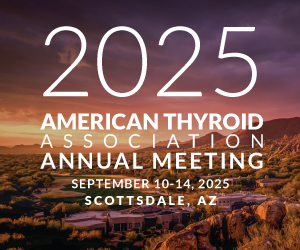October 28, 2014 — New research leading to a better understanding of thyroid cell development, the safe use of medication to treat hyperthyroidism in pregnant women, and gender disparities in the incidence and aggressiveness of thyroid cancer will be presented in oral presentations delivered at the 84th Annual Meeting of the American Thyroid Association, October 29-November 2, 2014, in Coronado, California.
In the presentation “Differentiation of Human Embryonic Stem (hES) Cells into Thyroid Cells,” Risheng Ma and colleagues, Icahn School of Medicine at Mount Sinai and James J. Peter VA Medical Center (New York, NY) describe their research to identify the regulatory factors involved in directing human embryonic stem cells (hES) to differentiate into functional human thyroid cells. Based on studies of mouse embryonic stem cell differentiation, the researchers selected two regulatory transcription factors to over-express in hES cells, PAX8 and NKX2-1, either alone or in combination. They showed that when both transcription factors were over-expressed, several thyroid-specific genes were activated, inducing the stem cells to differentiate into functional thyroid cells.
Naoko Arata, Ph.D., National Center for Child Health and Development (Tokyo, Japan), and colleagues describe the results of a prospective study of women with Graves’ disease who became pregnant, comparing pregnancy outcomes among women who took any dose of the anti-hyperthyroidism drugs methimazole (MMI) or propylthiouracil (PTU), during the first trimester (12 weeks) of pregnancy. The authors sought to determine whether the prevalence of MMI embryopathy–a disorder characterized by various fetal defects–increases if the fetus is exposed to MMI during the first trimester. This research is part of a larger ongoing study to clarify whether stopping MMI in early pregnancy is safe. In the presentation “Pregnancy Outcomes of Exposure to Methimazole (POEM) Study: An Interim Report,” the researchers report five cases of MMI-related embryopathy in 85 live births, which is higher than the estimated general incidence of 0.1%. No cases of MMI-related embryopathy occurred among the live births of women taking only PTU or taking neither drug.
Thyroid cancer is one type of human malignancy that has clear gender disparities. It occurs more often in women but is a more aggressive disease in men. Lisa Zhang, Ph.D., National Cancer Institute, U.S. National Institutes of Health (Bethesda, MD) and colleagues evaluated the effects of sex hormones on thyroid cancer using a mouse model that mimics human follicular thyroid cancer (FTC) development. In the oral presentation “Sex Hormones Regulate Thyroid Cancer Initiation and Progression by Modifying Tumor Suppressor Gene Expression and Tumor Immunity” they show that castration led to lower rates of thyroid cancer in female mice and less advanced cancer in male mice, suggesting that sex hormones play an important role in the development and progression of FTC. In the castrated male mice, giving them testosterone reversed the slowed progression. The researchers found that testosterone regulates the expression of tumor-suppressor genes and affects tumor immunity.
###
The American Thyroid Association (ATA) is the leading worldwide organization dedicated to the advancement, understanding, prevention, diagnosis, and treatment of thyroid disorders and thyroid cancer. ATA is an international membership medical society with over 1,700 members from 43 countries around the world. Celebrating its 91st anniversary, the ATA delivers its mission — of being devoted to thyroid biology and to the prevention and treatment of thyroid disease through excellence in research, clinical care, education, and public health — through several key endeavors: the publication of highly regarded professional journals, Thyroid, Clinical Thyroidology, and VideoEndocrinology; annual scientific meetings; biennial clinical and research symposia; research grant programs for young investigators, support of online professional, public and patient educational programs; and the development of guidelines for clinical management of thyroid disease and thyroid cancer. The ATA promotes thyroid awareness and information through its online Clinical Thyroidology for the Public (distributed free of charge to over 11,000 patients and public subscribers) and extensive, authoritative explanations of thyroid disease and thyroid cancer in both English and Spanish. The ATA website serves as the clinical resource for patients and the public who look for reliable information on the Internet.



